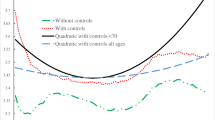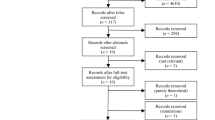Abstract
This study aims at disentangling the causal effects of unemployment on physical and mental health from the selection of the unhealthy into unemployment. To identify causal effects, it explores hypotheses concerning how physical and mental health deterioration gain additional momentum with a longer duration of unemployment. In contrast, mere selection into unemployment implies time-constant effects of unemployment on physical and mental health. Fixed-effects models are applied to data from the German Socio-Economic Panel (GSOEP, 2002–2014, 74,572 observations). Pointing at causal effects of unemployment, the findings show that physical health does not deteriorate before, during or immediately after the period in which individuals lose their jobs, but that deterioration gains momentum later. The effect further depends on age at transition to unemployment. In contrast, a large part of the poorer mental health of the unemployed might be due to the selection of the unhealthy into unemployment; mental health declines even before job loss. Only for people who experience unemployment early in life, mental health deterioration gains some momentum in the time after the transition, indicating a (weak) causal effect of unemployment on mental health for younger individuals.

Source: author calculations based on Model V in Table 3

Source: author calculations based on Model VII in Table 4
Similar content being viewed by others
Notes
In contrast to other countries, in Germany, the unemployed are not dropped from public health insurance. However, in recent decades, the catalogue of public health insurance benefits has been restricted to the basics [10]. Therefore, many people have to purchase additional insurance policies [11, 12] or pay for some therapies themselves.
Some shortcomings of this approach have been discussed in the literature: Factory closures are very infrequent events, a job loss caused by a plant closure may have different mental consequences than losing a job due to an individual’s performance [49: 362], and those who lost their jobs due to a plant closure constitute a very selected group [49: 362, 46: 1397, 50].
If the progressive illness has not yet a heavy impact on work performance, the discussed first scenario for an anticipated decline in health holds.
Persons on parental leave or in military service are treated as being employed because these people later may be at risk of unemployment during the panel.
Note that in some cases, within the 24 months between two waves employment might not be directly followed by unemployment but by some months of inactivity before starting a new job search.
As is discussed in Sect. “Robustness checks”, the results of the analysis stay qualitatively unchanged, when the analysis is restricted to only one period of unemployment per respondent.
For the application in the GSOEP, the SF12v2 has been slightly modified (see [55] for details).
See [48: Appendix A2 on page 556] for an English documentation of the questionnaire.
Please note that when allowing only one spell of unemployment, physical health deteriorates significantly at the observation preceding the unemployment spell, indicating a selection effect. See Sect. “Robustness checks” for a discussion.
See “Hypotheses and methodological approach” and “Discussion” for limitations to this conclusion.
The discussed effects rely on a sufficient number of cases, even at high durations of unemployment. As documented in Table 2, there are 56 observations with an unemployment duration between 9 and 12 years. And, as documented in Sect. “Robustness checks”, there are highly significant and strong effects for high unemployment durations when using a dummy-system.
References
Paul, K.I., Moser, K.: Unemployment impairs mental health: Meta-analyses. J. Vocat. Behav. 74(3), 264–282 (2009). https://doi.org/10.1016/j.jvb.2009.01.001
Wanberg, C.R.: The individual experience of unemployment. Annu. Rev. Psychol. 63, 369–396 (2012). https://doi.org/10.1146/annurev-psych-120710-100500
Jahoda, M.: Employment and Unemployment. Cambridge University Press, Cambridge (1982)
Jahoda, M.: Unemployed men at work. In: Fryer, D., Ullah, P. (eds.) Unemployed People. Social and Psychological Perspectives, pp. 1–73. Open University Press, Milton Keynes (1987)
Schmitz, H.: Why are the unemployed in worse health? Labour Econ. 18(1), 71–78 (2011). https://doi.org/10.1016/j.labeco.2010.08.005
Gebel, M., Voßemer, J.: The impact of employment transitions on health in Germany. A difference-in-differences propensity score matching approach. Soc. Sci. Med. 108, 128–136 (2014). https://doi.org/10.1016/j.socscimed.2014.02.039
Korpi, T.: Accumulating disadvantage. Longitudinal analyses of unemployment and physical health in representative samples of the Swedish population. Eur. Sociol. Rev. 17(3), 255–273 (2001). https://doi.org/10.1093/esr/17.3.255
Young, C.: Losing a job: the nonpecuniary cost of unemployment in the United States. Soc. Forces 91(2), 609–634 (2012). https://doi.org/10.1093/sf/sos071
Ferrie, J.E., Shipley, M.J., Marmot, M.G., Stansfeld, S., Davey Smith G: Health effects of anticipation of job change and non-employment: longitudinal data from the Whitehall II study. BMJ 311, 1264–1269 (1995)
Lisac, M., Reimers, L., Henke, K.-D., Schlette, S.: Access and choice—competition under the roof of solidarity in German health care: an analysis of health policy reforms since 2004. Health Econ. Policy Law 5(1), 31–52 (2010). https://doi.org/10.1017/S1744133109990144
Zok, K.: Bonusprogramme und Zusatzversicherungen in der GKV. WIdOmonitor 2(1), 1–7 (2005)
Zok, K.: Interesse an privaten Zusatzversicherungen. WIdOmonitor 6(2), 1–8 (2009)
Marcus, J.: Does job loss make you smoke and gain weight? Economica 81, 626–648 (2014)
Schunck, R., Rogge, B.G.: No causal effect of unemployment on smoking? A German panel study. Int. J. Public Health 57(6), 867–874 (2012)
Low, C.A., Thurston, R.C., Matthews, K.A.: Psychosocial factors in the development of heart disease in women: current research and future directions. Psychosom. Med. 72(9), 842–854 (2010). https://doi.org/10.1097/PSY.0b013e3181f6934f
Steptoe, A., Kivimäki, M.: Stress and cardiovascular disease: an update on current knowledge. Annu. Rev. Public Health 34, 337–354 (2013). https://doi.org/10.1146/annurev-publhealth-031912-114452
De Hert, M., Correll, C.U., Bobes, J., Cetkovich-Bakmas, M., Cohen, D., Asai, I., Detraux, J., Gautam, S., Möller, H.-J., Ndetei, D.M., Newcomer, J.W., Uwakwe, R.L.S.: Physical illness in patients with severe mental disorders. World Psychiatry. 10(1), 52–77 (2011). https://doi.org/10.1002/j.2051-5545.2011.tb00014.x
Collins, E., Tranter, S., Irvine, F.: The physical health of the seriously mentally ill: an overview of the literature. J. Psychiatr. Ment. Health Nurs. 19(7), 638–646 (2012). https://doi.org/10.1111/j.1365-2850.2011.01831.x
Kuh, D., Ben-Shlomo, Y., Lynch, J., Hallqvist, J., Power, C.: Life course epidemiology. J. Epidemiol. Commun. Health 57, 778–783 (2003)
Christensen, U., Kriegbaum, M., Hougaard, C.O., Mortensen, O.S., Diderichsen, F.: Contextual factors and social consequences of incident disease. Eur. J. Public Health. 18(5), 454–459 (2008). https://doi.org/10.1093/eurpub/ckn049
Varekamp, I., van Dijk, F.J.H.: Workplace problems and solutions for employees with chronic diseases. Occup. Med. 60(4), 287–293 (2010). https://doi.org/10.1093/occmed/kqq078
García-Gómez, P., Jones, A.M., Rice, N.: Health effects on labour market exits and entries. Labour Econ. 17(1), 62–76 (2010). https://doi.org/10.1016/j.labeco.2009.04.004
Riphahn, R.T.: Income and employment effects of health shocks. A test case for the German welfare state. J. Popul. Econ. 12(3), 363–389 (1999). https://doi.org/10.1007/s001480050104
Lindholm, C., Burström, B., Diderichsen, F.: Does chronic illness cause adverse social and economic consequences among Swedes? Scand. J. Public Health. 29(1), 63–70 (2001). https://doi.org/10.1080/14034940151107064
Weber, A., Hörmann, G., Heipertz, W.: Arbeitslosigkeit und Gesundheit aus sozialmedizinischer Sicht. Deutsches Ärzteblatt 104(43), 2957–2962 (2007)
Chandola, T., Bartley, M., Sacker, A., Jenkinson, C., Marmot, M.: Health selection in the Whitehall II study. UK. Soc. Sci. Med. 56(10), 2059–2072 (2003). https://doi.org/10.1016/S0277-9536(02)00201-0
Matsekaasa, A.: Unemployment and health. J Commun. Appl. Soc. Psychol. 6(3), 189–205 (1996). https://doi.org/10.1002/(SICI)1099-1298(199608)6:3<189::AID-CASP366>3.0.CO;2-O
Varekamp, I., van Dijk, F.J.H., Kroll, L.E.: Workers with a chronic disease and work disability. Problems and solutions. Bundesgesundheitsblatt Gesundh. Gesundh. 56(3), 406–414 (2013). https://doi.org/10.1007/s00103-012-1621-1
Cardano, M., Costa, G., Demaria, M.: Social mobility and health in the Turin longitudinal study. Soc. Sci. Med. 58(8), 1563–1574 (2004). https://doi.org/10.1016/S0277-9536(03)00354-X
Stewart, J.M.: The impact of health status on the duration of unemployment spells and the implications for studies of the impact of unemployment on health status. J Health Econ. 20(5), 781–796 (2001). https://doi.org/10.1016/S0167-6296(01)00087-X
Wynne, R., McAnney, D.: Employment and Disability. European Foundation for the Improvement of Living and Working Conditions, Dublin (2004)
OECD: Employment Outlook 2003. OECD, Paris (2003)
Vinokur, A.D., Schul, Y.: The web of coping resources and pathways to reemployment following a job loss. J. Occup. Health Psychol. 7(1), 68–83 (2002). https://doi.org/10.1037/1076-8998.7.1.68
Crossley, C.D., Stanton, J.M.: Negative affect and job search. J. Vocat. Behav. 66(3), 549–560 (2005). https://doi.org/10.1016/j.jvb.2004.05.002
Wanberg, C.R., Zhu, J., Van Hooft, E.A.J.: The job search grind: perceived progress, self-reactions, and self-regulation of search effort. Acad. Manag. J. 53(4), 788–807 (2010)
Ginexi, E.M., Howe, G.W., Caplan, R.D.: Depression and control beliefs in relation to reemployment: what are the directions of effect? J. Occup. Health Psychol. 5(3), 323–336 (2000). https://doi.org/10.1037/1076-8998.5.3.323
Möller, J., Schmillen, A.: Verteilung von Arbeitslosigkeit im Erwerbsleben, vol. 24. Kurzberichte des Instituts für Arbeitsmarkt- und Berufsforschung, pp. 1–8 (2008)
Weber, B., Weber, E.: Qualifikation und Arbeitsmarkt: Bildung ist der beste Schutz vor Arbeitslosigkeit, vol. 4. Kurzberichte des Instituts für Arbeitsmarkt- und Berufsforschung, pp. 1–8 (2013)
Bartley, M., Ferrie, J., Montgomery, S.M.: Living in a high-unemployment economy. In: Marmot, M., Wilkinson, R.G. (eds.) Social Determinants of Health, pp. 81–104. Oxford University Press, Oxford (1999)
Ross, C.E., Mirowsky, J.: Does employment affect health? J. Health Soc. Behav. 36(3), 230–243 (1995)
Brüderl, J.: Kausalanalyse mit Paneldaten. In: Wolf, C., Best, H. (eds.) Handbuch der Sozialwissenschaftlichen Datenanalyse, pp. 963–994. VS Verlag für Sozialwissenschaften, Springer Fachmedien, Wiesbaden (2010)
Browning, M., Dano, A.M., Heinesen, E.: Job displacement and stress-related health outcomes. Health Econ. 15(10), 1061–1075 (2006). https://doi.org/10.1002/hec.1101
Salm, M.: Does job loss cause ill health? Health Econ. 18(9), 1075–1089 (2009). https://doi.org/10.1002/hec.1537
Kuhn, A., Lalive, R., Zweimüller, J.: The public health costs of job loss. J Health Econ. 28(6), 1099–1115 (2009). https://doi.org/10.1016/j.jhealeco.2009.09.004
Sullivan, D., von Wachter, T.: Job displacement and mortality: an analysis using administrative data. Q. J. Econ. 124(3), 1265–1306 (2009). https://doi.org/10.1162/qjec.2009.124.3.1265
Eliason, M., Storrie, D.: Does job loss shorten life? J Human Resour 44(2), 277–302 (2009)
Böckerman, P., Ilmakunnas, P.: Unemployment and self-assessed health: evidence from panel data. Health Econ. 18(2), 161–179 (2009). https://doi.org/10.1002/hec.1361
Marcus, J.: The effect of unemployment on the mental health of spouses—evidence from plant closures in Germany. J Health Econ 32, 546–558 (2013)
Brand, J.E.: The far-reaching impact of job loss and unemployment. Ann. Rev. Sociol. 41, 359–375 (2015). https://doi.org/10.1146/annurev-soc-071913-043237
Schwerdt, G.: Labor turnover before plant closure: “leaving the sinking ship” vs. “captain throwing ballast overboard”. Labour Econ. 18(1), 93–101 (2011). https://doi.org/10.1016/j.labeco.2010.08.003
Ben-Shlomo, Y., Cooper, R., Kuh, D.: The last two decades of life course epidemiology, and its relevance for research on ageing. Int. J. Epidemiol. 45(4), 973–988 (2016). https://doi.org/10.1093/ije/dyw096
Jackson, P.R., Warr, P.B.: Unemployment and psychological ill-health. Psychol. Med. 14(3), 605 (1984). https://doi.org/10.1017/S003329170001521X
World Health Organisation (2018). http://www.who.int/features/factfiles/mental_health/en/. Accessed 30 Apr 2018
Ware, J.E., Dewey, J.E., Kosinski, M.: How to Score Version 2 of the SF-36 Health Survey. QualityMetric, Lincoln (2001)
Andersen, H.H., Mühlbacher, A., Nübling, M., Schupp, J., Wagner, G.G.: Computation of standard values for physical and mental health scale scores using the SOEP version of SF-12v2. Schmollers Jahrbuch 127(1), 171–182 (2007)
Gill, S.C., Butterworth, P., Rodgers, B., Mackinnon, A.: Validity of the mental health component scale of the 12-item Short-Form Health Survey (MCS-12) as measure of common mental disorders in the general population. Psychiatry Res. 152(1), 63–71 (2007)
Salyers, M.P., Bosworth, H.B., Swanson, J.W., Lamb, J., Osher, F.C.: Reliability and validity of the SF-12 health survey among people with severe mental illness. Med. Care 38(11), 1141–1150 (2000)
Allison, P.D.: Using panel data to estimate the effects of events. Sociol. Methods Res. 23, 174–199 (1994)
Angrist, J.D., Pischke, J.-S.: Mostly Harmless Econometrics. Princeton University Press, Princeton (2009)
Halaby, C.N.: Panel models in sociological research: theory into practice. Ann. Rev. Sociol. 30(1), 507–544 (2004). https://doi.org/10.1146/annurev.soc.30.012703.110629 doi
van den Bogaard, L., Henkens, K., Kalmijn, M.: Retirement as a relief? The role of physical job demands and psychological job stress for effects of retirement on self-rated health. Eur. Sociol. Rev. 32(2), 295–306 (2016). https://doi.org/10.1093/esr/jcv135
Acknowledgements
I would like to thank Nico Seifert, the Thomas Klein working group at the Max Weber Institute in Heidelberg and participants in several presentations for their useful comments on earlier versions of this paper.
Author information
Authors and Affiliations
Corresponding author
Rights and permissions
About this article
Cite this article
Stauder, J. Unemployment, unemployment duration, and health: selection or causation?. Eur J Health Econ 20, 59–73 (2019). https://doi.org/10.1007/s10198-018-0982-2
Received:
Accepted:
Published:
Issue Date:
DOI: https://doi.org/10.1007/s10198-018-0982-2




